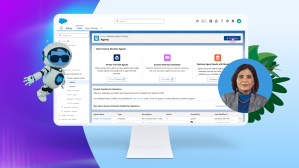In the early days of the telephone, people wondered if the machines might be used to communicate with the dead. In the context of the 1900s, the speculation was not fanciful or backward. People simply had no idea what to expect.
Today, people expect to have the same ease and personal connection as a phone call when they engage with companies, but want it across a much broader array of channels. The bar is raised higher and higher all the time. The new Salesforce research report “State of the Connected Customer,” surveyed nearly 7,000 business buyers and consumers worldwide and found that customer expectations are soaring – and getting more complex.
The lines between B2B and B2C expectations are blurring
Consumers want business-level technology, and business buyers want personalized attention. Both groups of customers want the best data, service, communications, and connections, it matters less whether a connection is business or consumer, and much more whether that connection is data-rich, valuable to the customer, and secure.
As we have taken our work laptops and work habits home, the convenience of corporate computing has entered our personal lives, giving us access to our information anytime, anywhere. Cloud computing has done more than perhaps any area of innovation to blur the lines between business-to-business and business-to-consumer technology. If work introduces you to a cloud-based project-collaboration app that you then adopt for your personal life, are you a business user or a consumer?
We may need a new category that captures customers’ increasingly sophisticated expectations. Salesforce futurist Peter Schwartz calls this new category B2i – business-to-individual. And there is plenty of data to support the idea of a new market sector driven by increasingly sophisticated expectations. Like waiters at high-end restaurants who become foodies themselves, many of us have cultivated our palettes for innovation at work, and brought that appetite home.
These new expectations also cut the other way. Corporate customers want fast personalized service that remains connected throughout the buyer experience. Eighty-two percent of business buyers say they want the same experience as when they’re buying for themselves. Foodie waiters bring their personal tastes to the job.
Business buyers want companies to anticipate their needs in a connected relationship that improves over time. Sixty-nine percent of business buyers say they expect an “Amazon-like” business buying experience. In other words, they seek vendors that understand their needs.
Companies are struggling to meet customers’ soaring expectations
Sixty-three percent of customers expect companies to provide new products/services more frequently than ever before, and 66% say it takes more for a company to impress them with those products and services than ever before. That’s proving to be a tall order for companies. Half of all customers say companies fall short of their customer experience expectations. And only 27% of business buyers say companies generally excel at meeting their standards for an overall experience.
Further complicating things, the very technological forces that are elevating customers’ standards are also hurting their actual experiences. Technology has changed so fast that customers feel blindsided and confused by the implications to their privacy and security. Some might argue that the Internet of Things has brought as many issues as benefits. Researchers have been able to secretly activate artificial intelligence systems on smartphones and smart speakers such as Apple’s Siri, Amazon’s Alexa, and Google’s Assistant. The New York Times reports that hackers could manipulate the technology to unlock doors, wire money, or buy stuff online — simply with music playing over the radio.
Customers are looking for protected data and personalized experiences
In this climate, how companies handle data is now critical to their ability to sustain customer relationships. At this year’s World Economic Forum in Davos, Switzerland, Founder and Chief Executive Marc Benioff said “Trust has to be the highest value in your company, and if it’s not, something bad is going to happen to you. It’s a culture issue.” If trust seems like an intangible character issue without return on investment, think again. Eighty-four percent of business buyers polled consider trust as a critical factor in choosing a vendor.
Ninety-four percent of business buyers say they’re more likely to trust businesses with their personal information if they give them control over what information is collected about them. Yet 84% of corporate customers are willing to share their information in exchange for a fully-customized customer experience. They want the tailored experiences informed by AI, data analytics and machine learning – while they also want security, too. Europe’s new General Data Protection Regulations and recent corporate data breaches have made privacy an even greater priority. Delivering both personalized service and staunch data protection is a real challenge for companies.
And when things do go wrong, companies today do not have the luxury of circling the wagons or privately addressing damage-control. Fifty-seven percent of customers have stopped buying from a company because a competitor provided a better experience.
And customers who feel let down let the world know – right away. Brand-shaming on social media has become an art. Sixty-two percent of customers say they share bad experiences with others on review sites and social networks, sometimes inflicting widespread reputational damage that extends far beyond personal networks.On the bright side, 72% of customers share good experiences with others. And two-thirds of them will pay a premium to companies that offer superior experiences.
Today’s customers want the best of corporate and consumer technology and service. And they expect their data to be protected.
That’s not demanding, it’s discerning. Customers have every right to expect these high standards. The question is: Who’s going to give it to them?
We’re publishing a series of articles focused on the future of customer experience in the run up to Connections, June 12-14 in Chicago. For more insight, check out this 5-point checklist for exceptional customer experience; this article on why customer experience begins with understanding human nature; and this interview with Glen Hartman of Accenture on the power of empathy in creating personalized customer experiences.




















